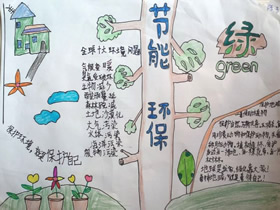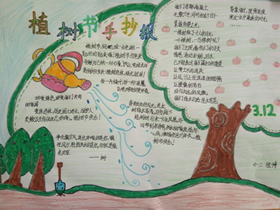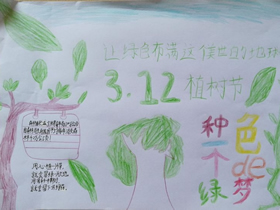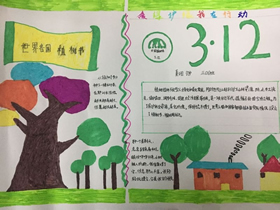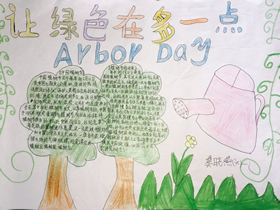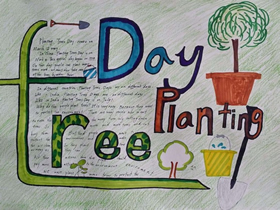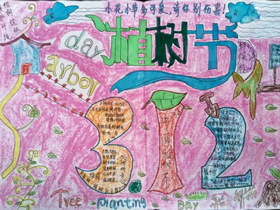
篇一:描写植树节的英语作文
Planting Trees Day comes on March 12 every year. Do you know what can we do to help on the day?
In China, Planting Trees Day is on March 12. This special day began in 1979. On that day, people can plant many trees. And if we plant trees more, we must also take care of the trees by watering them until they grow up to be strong. In different countries, Planting Trees Days are on different days. Like in India, Planting Trees Day is on July 1.
Why do the people plant trees? It is very easy. Because they want to protect the environment. There are many people who want to earn the money form only cutting down trees. So more and more trees are cut by them. But kind people want to protect the environment and make the air clean. So they plant trees as many as they can.
All these actions show that people should pay more attention to the environment. We want to make it better, don’t we? So we must plant more trees to protect the environment.
So, everyone, if you want to make the air clean, please try your best to protect the environment and plant more trees.


篇二:描写植树节的英语作文
The first Arbor Day took place on April 10, 1872 in Nebraska. It was the brainchild of Julius Sterling Morton (1832-1902), a Nebraska journalist and politician originally from Michigan. Throughout his long and productive career, Morton worked to improve agricultural techniques in his adopted state and throughout the United States when he served as President Grover Clevelands Secretary of Agriculture. But his most important legacy is Arbor Day.
Morton (photo, right) felt that Nebraskas landscape and economy would benefit from the wide-scale planting of trees. He set an example himself planting orchards, shade trees and wind breaks on his own farm and he urged his neighbours to follow suit. Mortons real opportunity, though, arrived when he became a member of Nebraskas state board of agriculture. He proposed that a special day be set aside dedicated to tree planting and increasing awareness of the importance of trees. Nebraskas first Arbor Day was an amazing success. More than one million trees were planted. A second Arbor Day took place in 1884 and the young state made it an annual legal holiday in 1885, using April 22nd to coincide with Mortons birthday.
In the years following that first Arbor Day, Mortons idea spread beyond Nebraska with Kansas, Tennessee, Minnesota and Ohio all proclaiming their own Arbor Days. Today all 50 states celebrate Arbor Day although the dates may vary in keeping with the local climate. (State Arbor Days) At the federal level, in 1970, President Richard Nixon proclaimed the last Friday in April as National Arbor Day. Arbor Day is also now celebrated in other countries including Australia. Variations are celebrated as Greening Week of Japan, The New Years Days of Trees in Israel, The Tree-loving Week of Korea, The Reforestation Week of Yugoslavia, The Students Afforestation Day of Iceland and The National Festival of Tree Planting in India. Julius Sterling Morton would be proud. Sometimes one good idea can make a real difference.


篇三:描写植树节的英语作文
on arbor day, particular attention is drawn to the part trees play in our lives. it's not just a day to plant trees and then forget the gesture for another twelve months. planting a tree one day is no credit to us if, during the rest of the year, we neglect to care for it and those already growing. our thought on arbor day should be an expression of enduring feeling, thought and action and not just one single, isolated flame of interest.
in schools and other community groups, this day can be celebrated in many different ways.
·by planting trees or shrubs in school grounds, along neighbouring streets or in civic parks.
·by 'adopting' a patch of bush, with the landowner's consent, and caring for it by removal of weeds, rubbish, etc, by preparing firebreaks and by fencing and making paths to reduce trampling.
·by presenting a play or mime about trees in the history of australia.
·as a class activity or common interest group go on a visit to a bush area with a spokesperson to explain the characteristics of plant species and their niche in the natural environment.
·collect some tree seeds, germinate them in a classroom, and plant out the seedling.
·carry out identification of trees in a specific part of your school or neighbourhood. a tree labelling ceremony could also be arranged.
·compile a list of everyday objects that are made of wood or wood-based materials, and find out how the wood was processed, where it came from and whatever else you can.
trees and shrubs, whether native or introduced to wa, provide opportunities for the interest and study by the whole community, and when we walk around our own neighbourhood or drive through the countryside, we can appreciate the importance of such a diversity of plants to the well being of humanity.

 儿童画画图片大全
儿童画画图片大全